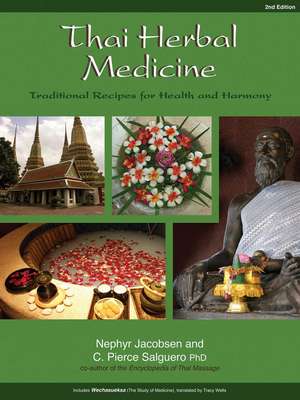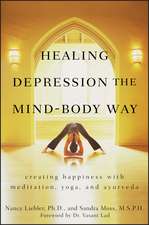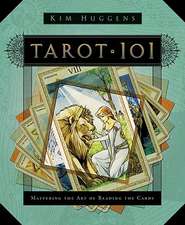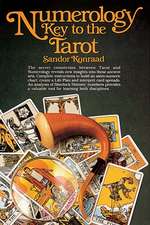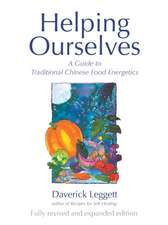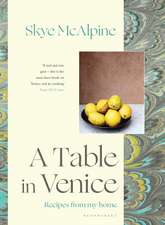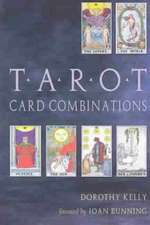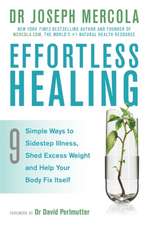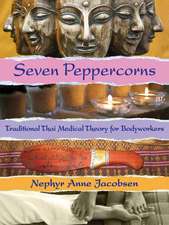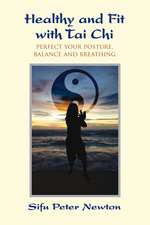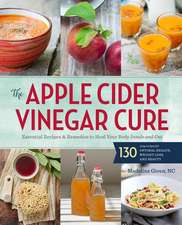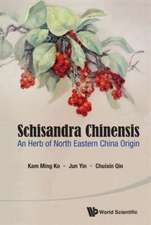Thai Herbal Medicine: Traditional Recipes for Health and Harmony
Autor Nephyr Jacobsen, C. Pierce Salguero PhDen Limba Engleză Paperback – feb 2014
Preț: 66.21 lei
Preț vechi: 79.14 lei
-16% Nou
Puncte Express: 99
Preț estimativ în valută:
12.67€ • 13.26$ • 10.48£
12.67€ • 13.26$ • 10.48£
Carte disponibilă
Livrare economică 21 martie-02 aprilie
Preluare comenzi: 021 569.72.76
Specificații
ISBN-13: 9781844096275
ISBN-10: 1844096270
Pagini: 228
Ilustrații: 17 color illustrations
Dimensiuni: 191 x 254 x 20 mm
Greutate: 0.52 kg
Ediția:Revizuită
Editura: Inner Traditions/Bear & Company
Colecția Findhorn Press
ISBN-10: 1844096270
Pagini: 228
Ilustrații: 17 color illustrations
Dimensiuni: 191 x 254 x 20 mm
Greutate: 0.52 kg
Ediția:Revizuită
Editura: Inner Traditions/Bear & Company
Colecția Findhorn Press
Notă biografică
Nephyr Jacobsen is the founder and director of The Naga Center, School of Traditional Thai Massage and Medicine in Portland Oregon. She has been traveling to Thailand regularly since 1998 to research traditional Thai healing arts including herbalism and bodywork therapies. Dedicated to the study and practice of truly authentic traditional medicine traditions. See more information at www.nagacenter.org. Dr. C. Pierce Salguero has a Ph.D. in the History of Medicine from the Johns Hopkins School of Medicine and is a researcher of Asian medical traditions specializing in Buddhist-influenced medical traditions. Dr. Salguero is a college professor in the Philadelphia area, where he teaches courses in Asian history, religion, philosophy, and medicine. A prominent proponent of Traditional Thai Massage & Medicine in the West, he also teaches advanced courses on the subject. See more information at www.piercesalguero.com.
Extras
Avoiding Toxins
In our opinion, Jivaka’s motto that everything is medicine should be reinterpreted in modern times. Certain man-made foods that are available today are so toxic to the system that we would argue they don’t have enough redeeming nutritional or medicinal qualities to offset the dangers of eating them. Herbalists, natural healers, and traditional nutritionists the world over have warned that the following modern foods and additives should be on everyone’s list of items to avoid:
Highly rfined sugars
The tendency in Western health communities to vilify all sugars does not fit with TTM theory. Natural unprocessed sugars are considered extremely useful medicines for hydration, and honey is used in countless medicines for a variety of purposes. This said, sugar intake should not be excessive, and highly refined sugars should always be avoided. The worst culprits include white crystalized sugar and high-fructose corn syrup, which are poisons to the body, overtax the metabolic system, and can lead to diabetes and liver or kidney problems. Use honey, grade B maple syrup, raw sugar, stevia, jaggery, or palm sugar as a substitute.
Bleached white flour
This over-processed food is extremely common in modern Western cuisine. Bleached flour not only can contain high levels of toxins but it has been stripped of almost all of its nutritional value (which then is added back in to make “enriched flour). White flour breaks down rapidly into sugar in the digestive system, and leads to the same conditions as excess sugar consump- tion. Furthermore, white flour is exceedingly difficult for the digestive tract to handle, leading to sluggish digestion, and depletion of the Wind and Fire Elements. Use unbleached white or whole wheat flour instead.
Milk
Milk is another case of an over-processed food. Much of the nutritional value in raw milk is neu- tralized by the pasteurization and homogenization process, and then has to be added back in after processing. The vitamin D touted by the dairy industry is usually an additive, and can just as easily be ingested through other foods or supplements. The dairy industry is also a leading user of hor- mones and antibiotics, which many health advocates believe can enter the human system and cause long-term damage to the endocrine and immune systems. Raw or pasteurized cream-top milk from grassfed cows is largely considered a better nutritional choice, although there are some concerns with its safety and local laws vary. You can also use kefir or yogurt, goat milk, or dairy substitutes such as homemade almond or rice milk.
Hydrogenated Oil
With a chemical composition close to plastic, hydrogenated oils are some of the most dangerous and non-nutritive substances in our foods. Hydrogenation is usually done for consistency or tex- ture, as food companies believe it makes the food appear less greasy than whole oil. The process renders beneficial oils useless by the body, and hydrogenated oils are immediately stored as fat.
Hydrogenated oils also lead to heart and circulatory disease. Look for hydrogenation-free products, as these are widely available.
Artificial Colors, Flavors, Preservatives, and Other Additives
The typical Western consumer eats piles of chemical food additives in every meal. These unnatural ingredients are both unhealthy and unnecessary. Read the nutritional labels on your food purchas- es, and look for alternative, 100 percent natural foods. Remember that in TTM, everything you put into your mouth has a transformative effect on your body and mind. It is therefore essential that you eat mindfully, trying to maximize the natural, healthy ingredients in your diet and minimize the artificial additives.
When examining the typical American diet, you may notice that many of us eat items from the above list in every meal. In fact, some “American classics”—such as a hamburger, fries, and Coke from a fast-food chain, or Froot Loops and milk for breakfast—are almost totally made up of these items. Individuals should try to limit the amount of junk food intake, especially the very young and the very old, who lack the strength to deal with these toxins. According to the Thai theories of the Elements and Tastes, overeating these foods can result in serious disorders. Most of the above items are Sweet foods, which deplete the Wind Element, leading to depletion of digestion, sexuality, and mobility, and increasing the effects of aging. Because of their refined processing, these foods affect the body much more strongly than natural foods, which is what you should use if you are looking for the Sweet Flavor.
Another consideration that we might keep in mind, although Jivaka did not mention it and it is more of a modern concern, is the long-term global effects of our dietary choices for the sustainability and health of our planetary environment. For example, while they are not the health hazards that some of the foods above are, items such as palm oil, musk, shark’s fin, and so forth are directly related to environmental destruction and the endangerment of wild animals. We believe that foods that are environmentally unsustainable should be avoided as much as possible. This is not only a moral but also a health issue, as personal health becomes ever more difficult to maintain on a damaged planet.
There has been considerable controvery over the safety and ethics of genetically modified foods lately, which is an issue that deserves special mention. While GMOs are commonly sold in the United States, they are restricted in other countries with stronger food safety laws. Even if it is definitively proven that GMOs are safe to eat, there are considerable ethical problems that have yet to be worked out, including the environmental impact and social costs of corporate monopolies on seed supplies. For these reasons, we are currently of the belief that GMO foods should be avoided.
Dietary Regimen for Health and Longevity
While TTM provides guidelines for incorporating the Six Tastes into everyday dietary decisions, it is important to remember that some Element fluctuation is natural with seasonal shifts, time of day, and age. It is not recommended that anyone undertake extreme dietary change in reaction to these natural shifts. In general, it is also not suggested that you undertake a wholesale change all at once, as this will lead to further Elemental imbalances. Instead, you should lean slightly away from cer- tain foods and slightly toward others on a seasonal basis, or to accommodate for an imbalance. For instance, it is normal and appropriate that most people become slightly more Fiery during the sum- mertime, slightly Windier in the fall, and slightly more Watery in the winter. We are living organ- isms, not static objects, so movement in our Elemental balance is simply a side effect of being alive. The following guidelines are therefore suggestions for incorporating certain Tastes, not rigid rules.
Age
• Children up to age 16 should consume more Sweet, Bitter, and Sour foods to ward off childhood illnesses, colds, and coughs.
Recommended herbal supplements for children’s diet: anise, honey, gooseberry, lemon, licorice, lime, longan, milk, pineapple, tamarind.
• Young adults aged 16-32 should consume more Astringent, Salty, Bitter, and Sour foods for vitality, healthy blood, and bile.
Recommended herbal supplements for young adult diet: aloe juice, bitter gourd, chrysanthe- mum, gooseberry, green tea, lemon, lime, orange rind, pineapple, pomegranate, seafood, tama- rind.
• Adults aged 32 and older should consume more Spicy/Hot, Bitter, Salty, and Astringent foods.
Recommended herbal supplements for middle-age adult diet: aloe juice, basil, bitter gourd, black pepper, cardamom, cayenne, chrysanthemum, cinnamon, clove, garlic, ginger, green tea, jasmine, lemongrass, lotus, orange rind, pomegranate, seafood, turmeric, all bitter tonics.
• Adults aged 50 years and older are recommended to use special herbs as part of their diet for strength, longevity, and the heart.
Recommended herbal supplements for older adult diet (in addition to suggestions for those aged 32 and up): asafoetida, honey, jackfruit, papaya, safflower, sesame.
Season
TTM includes a number of different ways of connecting the seasons of the year with the dietary changes and herbal remedies one should consume. The most common of these systems counts three seasons. The advice for the three seasons are as follows:
• In the hot season, individuals should consume more Bitter, Astringent, and Sweet foods, which are cooling to the system and relieve Fire Element diseases.
• In the rainy season, one should ingest more foods of the Salty, Spicy/Hot, and Sour Taste, which alleviate the effects of Wind.
• In the cold season, Spicy/Hot (including the gentler Aromatic Pungent herbs) foods are recom- mended to stimulate the Fire Element.
In our opinion, Jivaka’s motto that everything is medicine should be reinterpreted in modern times. Certain man-made foods that are available today are so toxic to the system that we would argue they don’t have enough redeeming nutritional or medicinal qualities to offset the dangers of eating them. Herbalists, natural healers, and traditional nutritionists the world over have warned that the following modern foods and additives should be on everyone’s list of items to avoid:
Highly rfined sugars
The tendency in Western health communities to vilify all sugars does not fit with TTM theory. Natural unprocessed sugars are considered extremely useful medicines for hydration, and honey is used in countless medicines for a variety of purposes. This said, sugar intake should not be excessive, and highly refined sugars should always be avoided. The worst culprits include white crystalized sugar and high-fructose corn syrup, which are poisons to the body, overtax the metabolic system, and can lead to diabetes and liver or kidney problems. Use honey, grade B maple syrup, raw sugar, stevia, jaggery, or palm sugar as a substitute.
Bleached white flour
This over-processed food is extremely common in modern Western cuisine. Bleached flour not only can contain high levels of toxins but it has been stripped of almost all of its nutritional value (which then is added back in to make “enriched flour). White flour breaks down rapidly into sugar in the digestive system, and leads to the same conditions as excess sugar consump- tion. Furthermore, white flour is exceedingly difficult for the digestive tract to handle, leading to sluggish digestion, and depletion of the Wind and Fire Elements. Use unbleached white or whole wheat flour instead.
Milk
Milk is another case of an over-processed food. Much of the nutritional value in raw milk is neu- tralized by the pasteurization and homogenization process, and then has to be added back in after processing. The vitamin D touted by the dairy industry is usually an additive, and can just as easily be ingested through other foods or supplements. The dairy industry is also a leading user of hor- mones and antibiotics, which many health advocates believe can enter the human system and cause long-term damage to the endocrine and immune systems. Raw or pasteurized cream-top milk from grassfed cows is largely considered a better nutritional choice, although there are some concerns with its safety and local laws vary. You can also use kefir or yogurt, goat milk, or dairy substitutes such as homemade almond or rice milk.
Hydrogenated Oil
With a chemical composition close to plastic, hydrogenated oils are some of the most dangerous and non-nutritive substances in our foods. Hydrogenation is usually done for consistency or tex- ture, as food companies believe it makes the food appear less greasy than whole oil. The process renders beneficial oils useless by the body, and hydrogenated oils are immediately stored as fat.
Hydrogenated oils also lead to heart and circulatory disease. Look for hydrogenation-free products, as these are widely available.
Artificial Colors, Flavors, Preservatives, and Other Additives
The typical Western consumer eats piles of chemical food additives in every meal. These unnatural ingredients are both unhealthy and unnecessary. Read the nutritional labels on your food purchas- es, and look for alternative, 100 percent natural foods. Remember that in TTM, everything you put into your mouth has a transformative effect on your body and mind. It is therefore essential that you eat mindfully, trying to maximize the natural, healthy ingredients in your diet and minimize the artificial additives.
When examining the typical American diet, you may notice that many of us eat items from the above list in every meal. In fact, some “American classics”—such as a hamburger, fries, and Coke from a fast-food chain, or Froot Loops and milk for breakfast—are almost totally made up of these items. Individuals should try to limit the amount of junk food intake, especially the very young and the very old, who lack the strength to deal with these toxins. According to the Thai theories of the Elements and Tastes, overeating these foods can result in serious disorders. Most of the above items are Sweet foods, which deplete the Wind Element, leading to depletion of digestion, sexuality, and mobility, and increasing the effects of aging. Because of their refined processing, these foods affect the body much more strongly than natural foods, which is what you should use if you are looking for the Sweet Flavor.
Another consideration that we might keep in mind, although Jivaka did not mention it and it is more of a modern concern, is the long-term global effects of our dietary choices for the sustainability and health of our planetary environment. For example, while they are not the health hazards that some of the foods above are, items such as palm oil, musk, shark’s fin, and so forth are directly related to environmental destruction and the endangerment of wild animals. We believe that foods that are environmentally unsustainable should be avoided as much as possible. This is not only a moral but also a health issue, as personal health becomes ever more difficult to maintain on a damaged planet.
There has been considerable controvery over the safety and ethics of genetically modified foods lately, which is an issue that deserves special mention. While GMOs are commonly sold in the United States, they are restricted in other countries with stronger food safety laws. Even if it is definitively proven that GMOs are safe to eat, there are considerable ethical problems that have yet to be worked out, including the environmental impact and social costs of corporate monopolies on seed supplies. For these reasons, we are currently of the belief that GMO foods should be avoided.
Dietary Regimen for Health and Longevity
While TTM provides guidelines for incorporating the Six Tastes into everyday dietary decisions, it is important to remember that some Element fluctuation is natural with seasonal shifts, time of day, and age. It is not recommended that anyone undertake extreme dietary change in reaction to these natural shifts. In general, it is also not suggested that you undertake a wholesale change all at once, as this will lead to further Elemental imbalances. Instead, you should lean slightly away from cer- tain foods and slightly toward others on a seasonal basis, or to accommodate for an imbalance. For instance, it is normal and appropriate that most people become slightly more Fiery during the sum- mertime, slightly Windier in the fall, and slightly more Watery in the winter. We are living organ- isms, not static objects, so movement in our Elemental balance is simply a side effect of being alive. The following guidelines are therefore suggestions for incorporating certain Tastes, not rigid rules.
Age
• Children up to age 16 should consume more Sweet, Bitter, and Sour foods to ward off childhood illnesses, colds, and coughs.
Recommended herbal supplements for children’s diet: anise, honey, gooseberry, lemon, licorice, lime, longan, milk, pineapple, tamarind.
• Young adults aged 16-32 should consume more Astringent, Salty, Bitter, and Sour foods for vitality, healthy blood, and bile.
Recommended herbal supplements for young adult diet: aloe juice, bitter gourd, chrysanthe- mum, gooseberry, green tea, lemon, lime, orange rind, pineapple, pomegranate, seafood, tama- rind.
• Adults aged 32 and older should consume more Spicy/Hot, Bitter, Salty, and Astringent foods.
Recommended herbal supplements for middle-age adult diet: aloe juice, basil, bitter gourd, black pepper, cardamom, cayenne, chrysanthemum, cinnamon, clove, garlic, ginger, green tea, jasmine, lemongrass, lotus, orange rind, pomegranate, seafood, turmeric, all bitter tonics.
• Adults aged 50 years and older are recommended to use special herbs as part of their diet for strength, longevity, and the heart.
Recommended herbal supplements for older adult diet (in addition to suggestions for those aged 32 and up): asafoetida, honey, jackfruit, papaya, safflower, sesame.
Season
TTM includes a number of different ways of connecting the seasons of the year with the dietary changes and herbal remedies one should consume. The most common of these systems counts three seasons. The advice for the three seasons are as follows:
• In the hot season, individuals should consume more Bitter, Astringent, and Sweet foods, which are cooling to the system and relieve Fire Element diseases.
• In the rainy season, one should ingest more foods of the Salty, Spicy/Hot, and Sour Taste, which alleviate the effects of Wind.
• In the cold season, Spicy/Hot (including the gentler Aromatic Pungent herbs) foods are recom- mended to stimulate the Fire Element.
Cuprins
Preface
I. Introduction to Traditional Thai Medicine
II. Thai Herbal Theory
III. Everyday Herbs
IV. Herbs in Traditional Thai Massage and Sauna
V. Internal Thai Herbal Medicine Therapies
VII. A Compendium of Traditional Thai Herbal Medicine
Indices
Appendices
I. Introduction to Traditional Thai Medicine
II. Thai Herbal Theory
III. Everyday Herbs
IV. Herbs in Traditional Thai Massage and Sauna
V. Internal Thai Herbal Medicine Therapies
VII. A Compendium of Traditional Thai Herbal Medicine
Indices
Appendices
Recenzii
“With my keen interest in Ayurveda, I found this book particularly interesting. I would recommend it for anybody interested in Eastern medical traditions and they like me may feel that this book is great introduction to Thai medicine leaving one hungry to know a lot more!”
"This book is a must have for Thai herbal practitioners."
"This book is a must have for Thai herbal practitioners."
